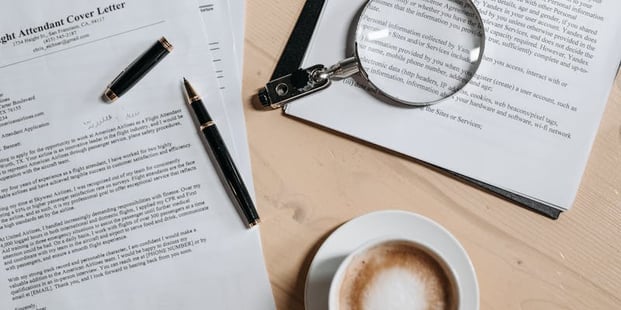
By
Leanna Seah
August 19, 2024
Updated
September 4, 2024
Should you include a cover letter in your application?
When it comes to job applications, one common question many job seekers have is: "Should I include a cover letter?"
The answer is usually yes, unless the job listing specifically says otherwise.
Why are cover letters important in job applications?
A cover letter is an integral part of your job search. It provides an opportunity to explain why you're the best fit for the position. In the middle of hundreds of applications, you have to stand out.
A good cover letter should be short, concise, and tailored to the job for which you're applying.
Craft a compelling, well-structured cover letter tailored to the specific job you're applying for. A4-sized and concise, the ideal letter grabs attention immediately.
Remember, cover letters aren't 'one-size-fits-all.'
They come in various formats, each suited to unique situations.
Whether you're responding directly to a job advert or networking, your cover letter serves as a personalised introduction to potential employers.
Leverage it to highlight your key skills and experiences relevant to the role.
In this guide, we'll cover the importance of a cover letter for career change and offer tips for crafting one that helps you stand out.
What is a cover letter?
 Source: Pexels
Source: Pexels
A cover letter is a crucial component of any job application, serving as your initial introduction to a prospective employer.
Essentially, a well-crafted cover letter sets the stage for your candidacy, allowing you to showcase your personality, skills, and enthusiasm for the role. It complements your resume by offering insights into your motivations and explaining why you are the perfect fit for the job.
Overall, a compelling cover letter can significantly enhance your chances of landing an interview and ultimately securing the job you desire.
Cover letter explaining gaps in employment
Unexplained gaps in your employment history can be a red flag for hiring managers.
If you have periods of unemployment, don't ignore them—address these gaps proactively in your cover letter.
Focus on what you've learned and the new skills you've acquired during this time together with relevant experience to the role, supporting your statements with evidence whenever possible.
Crafting a cover letter for a career change
Career changes are common, and your cover letter can serve as the perfect platform to explain your transition. A well-written cover letter will illustrate how your existing skill set, such as analytical or project management skills, can be transferred to your new career path.
Remember that transferable skills and soft skills are extremely important here.
End by discussing how the prospective employer can benefit from your unique perspective and skill set.
Speculative cover letter
If you’re looking for a job in a competitive industry, you might find that not all roles are formally advertised. This means being more proactive with your search and reaching out to companies directly.
To do this, you should write a speculative cover letter.
Before writing a speculative cover letter, research the company and understand its type of work.
It’s also helpful to learn about the organisation’s goals and values so that you can relate them to your own personal work values.
In the letter, explain the type of role you’re looking for and then demonstrate your research by explaining why you’d like to work with the company.
It’s also essential to include your skills and experience (ideally, try not to restrict yourself by focusing on one particular skill).
How to highlight your master's degree in a cover letter

Source: Pexels
Knowing how to sell your master's degree qualifications will help you get your next job.
Holding a master's degree can give you a competitive edge. Make this clear in your cover letter by discussing the specific skills you gained during your postgraduate studies, such as data analysis or infrastructural design.
Provide examples of work experiences where you have applied these skills successfully.
Cover letter for an international position
The global job market offers exciting opportunities, especially in technical and engineering sectors.
Your cover letter should focus on your qualifications and experience while considering international factors like potential language translation.
In this case, the application letter is crucial to showing how eager you are to take a position outside your native country.
Tips for writing an effective cover letter
 Source: Pexels
Source: Pexels
Employers and hiring managers receive a lot of applications every day, so it's important to make your cover letter stand out.
Here are some helpful tips for making a lasting impression and increasing your chances of getting hired.
Tip 1: Customise your cover letter
Write a cover letter for every position you're applying for and tailor it to the job description, rather than keeping the same letter for every application. There's no need to draft a new letter from scratch, but it's important to make it feel personal to each role.
This may be time-consuming, but if you send a generic cover letter, recruiters may notice that you did not put in the time and effort to apply for the job.
Making your cover letters personal to each role will show that you are truly interested in the job you’re applying for and that you are the ideal candidate.
Tip 2: Proofread your application
Double-check your cover letter and correct any grammar and spelling mistakes. Print out a copy of the document and recheck it to ensure it's error-free.
It might be useful to have a friend or colleague proofread your job letter as well, so they can catch any mistakes you might have missed.
Tip 3: Identify unique selling points
Confidently outline the unique selling points that position you as the best candidate for the job.
Explain how your skills and professional experience meet the job requirements. Again, tailor this to the company and job role you’re applying for. Your goal here is to stand out among other job candidates.
Tip 4: Use examples
Explain how you have used your skills and give relevant examples to support your claim. Examples and evidence of your previous experience will make your application more credible.
A cover letter tells your prospective employer a lot about you. It should be brief and concise while making an excellent first impression.
Tailor your cover letter so that it can achieve its purpose. Finally, remember that your cover letter should complement your CV rather than duplicate it.
Ready to find your next job?
Airswift specialises in global staffing solutions and recruitment services, specifically for the STEM sectors. We connect you with top-tier job opportunities in major organisations worldwide.
Start your journey by registering on our jobs board.
Customise your search with tailored job alerts to match your unique criteria, ensuring you find the role that's right for you.

